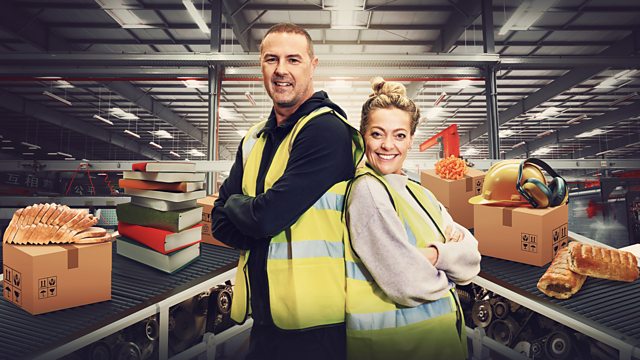
Cheese Curls
Paddy McGuinness visits a factory to explore the surprising process of turning potato starch into 500 million packs of Quavers cheese curls every year.
In this episode, Paddy McGuinness explores the secrets of the Walkers factory in Lincoln, to reveal how it makes 500 million packs of Quavers every year.
Paddy begins by meeting factory manager Layla Whiting, who reveals that, despite popular belief, cheese curls aren’t officially classed as crisps! In fact, while crisps are made from sliced potatoes, Quavers are made from the potato starch powder left behind during the crisp-making process. Their first stop is a huge mixer where the starch powder is added, along with equally fine rice and soya flours. Then they add some mild seasoning of salt, pepper, onion powder and yeast - but no cheese flavour yet. The whole lot is mixed with water to create a dough.
This is a huge and very hot factory! Comparing it to getting off a plane on holiday, Paddy exclaims, ‘this is like landing on the sun!’ But he soldiers on to the next stage of production. After mixing, the dough is forced under very high pressure through an extruder, emerging as a continuous one-millimetre-thick sheet. It looks more like a lasagne sheet at this stage and the process is nothing like Paddy imagined it would be.
To ensure every one of the snacks ends up with the famous curly shape, the dough is stretched over rollers to add tension. Then it travels through an 18-metre-long steamer, increasing the moisture level in the dough to 40%, making it more pliable and stretchy. After being quickly cooled, the continuous sheet of dough is sent rushing through a machine which chops it into 13 millimetre by 40 millimetre pellets, at a rate of 7,900 a minute. But the pellets contain too much moisture, so they are sent through a series of dryers, bringing the moisture content down to 11%.
Over in the frying area, Paddy learns how 1.2 tonnes of pellets travel through a specialist fryer every hour. Inside the fryer, the pellets are plunged into sunflower oil heated to 200 degrees Celsius. The heat of the oil causes any remaining water inside to turn to steam, puffing them and leaving tiny air holes. At the same time, the tension created when the dough was stretched now contracts and curls up. After twenty seconds in the oil, 1.8 million perfectly-formed curls cascade out of the fryer every hour. Finally, Paddy is able to see the curly snack he knows. There is one vital thing missing from the snacks though – cheese flavouring. To put that right, each one of the freshly cooked curls travels through a huge metal drum where a precise amount of cheese powder flavouring is applied.
After a welcome taste test, Paddy follows his snacks, still warm off the production line, to the packing department. First, a specialist machine called a multi-head weigher carefully portions out 16 grams of cheese curls before another machine seals them neatly into aluminium and plastic packets. Then, each packet is sent hurtling towards a robot which sorts them into groups of six, before they are packed into multipack bags.
Finally, the multipacks are put into boxes and placed on pallets before making their way to the dispatch area. There, Paddy learns how 93,600 packets are loaded onto each waiting lorry, before being sent to shops and supermarkets across the country.
Earlier in the episode, Cherry visits a Walkers crisp factory to learn how the starch from potato crisp production is transformed into the potato starch powder used to make the cheese curls. And she visits another factory in Leicester to find out how ten million bags of Bombay Mix are produced every year.
Meanwhile, historian Ruth Goodman learns how a group of American military scientists invented cheese flavouring during the Second World War.
On TV
Credits
| Role | Contributor |
|---|---|
| Presenter | Paddy McGuinness |
| Presenter | Cherry Healey |
| Presenter | Ruth Goodman |
| Production Company | Voltage TV |
Broadcast
- Tue 14 Jan 2025 20:00
Learn more about the history of the factory and how it has evolved with an interactive from The Open University.
The fascinating stories behind the production of some of our favourite products.
